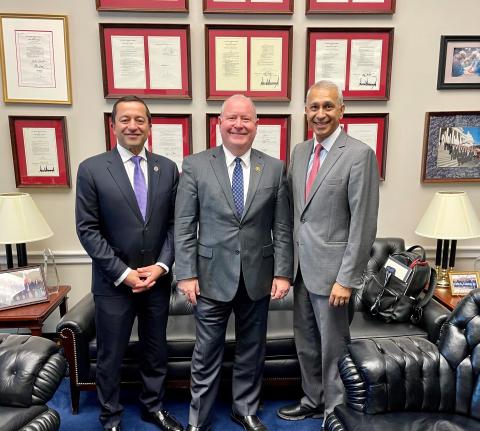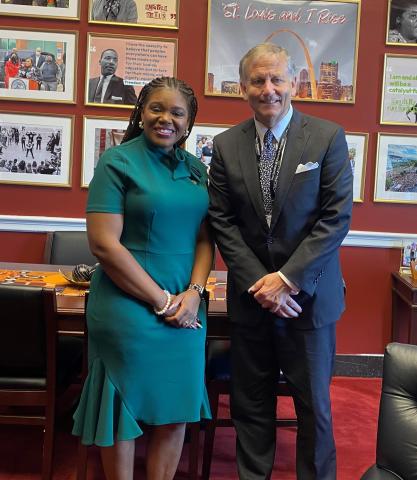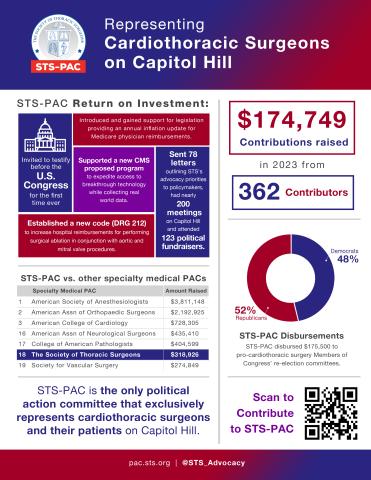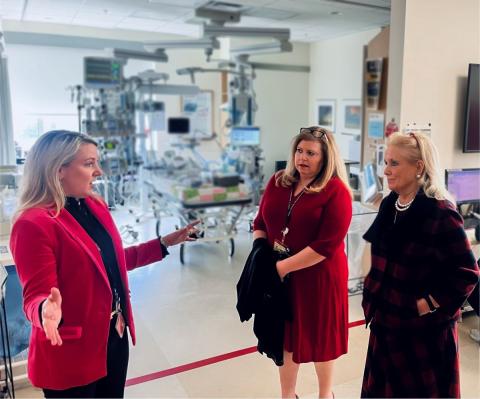Advocacy is an exciting and fruitful endeavor. By regularly engaging with policymakers and their staff, you can become a trusted resource on issues of importance to your specialty and patients.
There are many ways you can become involved in the Society's advocacy efforts. Read about the different opportunities available for connecting with your lawmakers, and then contact STS Government Relations to get started.
Click on the items below to learn more.
Sending a personal email is the quickest and preferred way to communicate with a lawmaker’s office. It is essential for them to hear directly from STS members who can provide personal stories and expertise on the specialty.
To send an email to your member of Congress, use the STS’s automated system (login required) to choose specific issues that are important to you and your patients. After selecting a specific advocacy issue, personalize the message. Lawmakers are always interested in specific firsthand stories. With just a few simple clicks, send that email directly to your representative and senators.
(Login Required)
Calling members of Congress is one of the most direct ways to contact their D.C. office.
To reach the office of your senators, dial 202-224-3121 for the Senate switchboard. For the House of Representatives, dial 202-225-3121.
Here is a sample script:
- INTRODUCTION: Calls are tracked by each office so start with your name and address to identify yourself as a constituent.
- OPENING: Let them if know that you are a Thoracic Surgeon (resident, attending, etc.) currently practicing in the state/district.
- ASK: Ask the office to pass a message along to the healthcare staffer. Ask for the name and email address of the healthcare staffer to send a follow-up email referring to your message.
- REQUEST: Request that the representative/senator support a specific action. There are many issues in our 2024 advocacy agenda, but choose one or two at most.

Meeting with a legislator or their staff is an important part of the advocacy process. While members have offices in their respective districts, most of their professional staff responsible for the healthcare portfolio work in the Washington D.C. office. To schedule a meeting in person or virtually, contact the D.C. office so we can work with you in preparation of the meeting and provide necessary resources.
Time Commitment: 30 minutes for virtual meetings. 60 minutes for an in-person meeting.

The STS Advocacy Conference provides attendees with the chance to advocate for STS’s key priorities by meeting with members of Congress and their staff. The conference is an excellent opportunity for networking with colleagues, engaging directly with policymakers and legislators, and becoming trusted constituents offering healthcare expertise. Registration for the 2025 Advocacy Summit on March 3-4, 2025, opens this fall.

The Society of Thoracic Surgeons Political Action Committee (STS-PAC) is the only PAC specifically dedicated to representing the interests of cardiothoracic surgeons and their patients on Capitol Hill.
Your support of STS-PAC is critical to ensuring that our Society has the resources to educate members of Congress on the issues impacting cardiothoracic surgeons.
(Login Required)

Hosting a member of Congress at your hospital is one of the most impactful ways to advocate for the specialty and your patients. STS staff is available to help coordinate and organize a visit with your member of Congress, provide talking points, and more.
Time Commitment: 1 hour+
Many members of Congress hold public events during the August recess. Follow your member on social media, check their website, or even call their local district office to see when they will host public meetings or opportunities to connect.
Time Commitment: variable
Political fundraisers are a necessary part of congressional campaigns. These events offer intimate opportunities to meet your member of Congress personally and advocate for the issues impacting your practice. If you are interested in attending a fundraiser, contact STS staff.
Sending a letter to the editor of your local media outlets is a great way to spread the word and gain exposure for some of our most important issues.
Tips on letters to the editor:
- PICK A TIMELY SUBJECT: Topics that are not already being covered in the news are rarely published.
- GUIDELINES: Most letters to the editor are approximately 250 words in length. Check with the local publication regarding submission parameters.
- ASSUME NOTHING: Do not assume readers are already informed on your topic. Give a concise but informative background before digging into the main issue. Write in plain language and define any medical terminology or acronyms. Refer to any newspaper article or editorial to which you are responding by date and title. Also, include any credentials.
- FIND A LOCAL ANGLE: Readers are more interested in an issue when they see how it affects their lives and communities.
- AVOID FORM LETTERS: Do not send the same letter to different outlets.
